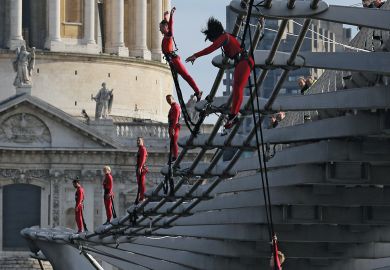The University of Warwick has agreed to pay the £66,000 legal bill incurred by Thomas Docherty, the professor whom it suspended after claims that he had sighed and used negative body language towards his former boss.
Warwick’s payment of full costs for the professor of English and comparative literature puts the disclosed legal bill for the case at £109,000, including part of the university’s own spending. However, the university refuses to reveal its full legal bill.
Details of the legal bill will raise more questions about why Warwick proceeded so far with the case.
Professor Docherty, a prominent critic of the marketisation of higher education, was suspended in January 2014 and faced a university tribunal after being accused of undermining the authority of his former head of department, Catherine Bates. He was cleared of all charges by the tribunal in October.
It is understood that shortly before the tribunal was held, the university told Professor Docherty that it would be represented by barristers, prompting him to hire his own barrister and thus escalating costs.
Warwick told Times Higher Education last week in a statement that it would be paying Professor Docherty’s costs, which it put at £55,000 plus VAT.
Figures obtained by THE under the Freedom of Information Act had already showed a bill of £43,000 for part of the university’s costs: its spending on a barrister and the legal fees incurred by the tribunal.
However, Warwick refused to divulge its full costs. The university claimed that this was not possible, as it commissions legal services from solicitors SGH Martineau on an annual retainer and costs are not paid in reference to individual cases.
As THE revealed, the case against Professor Docherty cited three incidents, including sighing, projecting negative body language and making “ironic” comments when interviewing candidates for a job at Warwick.
Warwick said in a previous statement that it accepted that there were “lessons to be learned in terms of its processes and procedures”. It also denied that “the case was related to Professor Docherty’s academic work or the important principle of academic freedom”.
Register to continue
Why register?
- Registration is free and only takes a moment
- Once registered, you can read 3 articles a month
- Sign up for our newsletter
Subscribe
Or subscribe for unlimited access to:
- Unlimited access to news, views, insights & reviews
- Digital editions
- Digital access to THE’s university and college rankings analysis
Already registered or a current subscriber? Login





